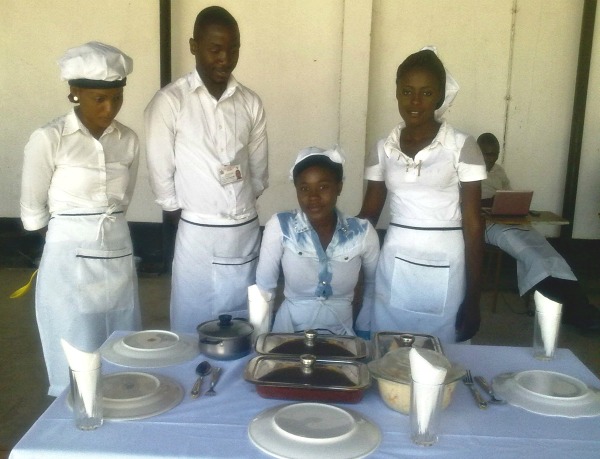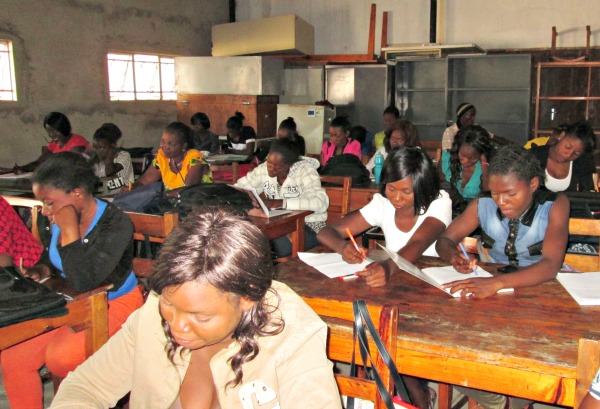
Food Service Demonstration, Hope House.
Philomena has a talent. Cooking and baking is her forté, her special gift.
She was18 when her mother died unexpectedly seven years ago in Lusaka, Zambia. Shattered though she was, as the eldest it fell to Philomena to raise her young family of six younger brothers and sisters. “Where there’s a will there’s a way”, she assured herself and set out to train and turn her talent into generating an income.
On United Nations International Family Day on15th May, stories like Philomena’s provide inspiration and hope in the strength of family love and bonds that motivate people to strike out in new directions.
What Philomena did next
Philomena took up training at Hope House run by the Jesuit Refugee Service to further her skills and gain a formal certificate.The ‘37 and More Skills’ course there trains girls in catering and hospitality.Young marginalised people between 18 and 22 years old, many of them mothers with families, study to extend their formal education in literacy and hygiene as well as taking classes in a practical skill like cookery.They are prepared to take up positions in the catering and hospitality sector.
Entrepreneurial skills are included too and Philomena hopes to open her own business if NGO funding is available to help her get her startup off the ground.Her dream is to extend her training to the many girls and young mothers living in the same underprivileged area of Lusaka.
Hope House has recently increased practical classes from two to four each week giving greater hands-on experiential learning, thanks to support from the Irish Jesuit Missions (IJM) and its supporters.The additional funding provided by IJM has also purchased a new electrical cooker, fridge and kitchen utensils for better training.
A big THANK YOU to IJM and supporters, from Zambia!
Participants on the Hope House ‘37 and More Skills’ course send greetings to IJM and supporters and displays the new items in this short ‘thank you’ video:
{youtube}dfXS-P5vKfc{/youtube}
Hope House is a starting point
The tutors are dedicated and encouraging, say the trainees, treating the trainees equally regardless of the strength of their talents. One tutor, Mrs Kamenda, reminds the girls: ”Don’t take this place of knowledge for granted because this is your starting point.”
A high rate of early marriage in Zambia—42 percent of women aged 20 to 24 are married before 18 years of age—leaves girls who are not educated with young families in vulnerable and potentially abusive situations.
Although with increasing administrative costs Hope House struggles to ensure quality training, it holds its vision of empowerment for young women living in poverty to graduate as skilled and employable workers.
Strengthening young women’s roles as skilled workers, trainers and entrepreneurs in their local communities can assist Zambia towards the attainment of sustainable development and sustainable lifestyles.

Women atteding a class at Hope House
The SDGs and UN International Family Day
Hope House works to contribute to UN Sustainable Development Goal 5 (SDG5) and the empowerment of women. All of the Jesuit education works contribute to SDG4 that seeks ‘to ensure inclusive and quality education for all and promote lifelong learning’, part of the United Nations 2030 Sustainable Development Agenda.
The UN states that International Family Day “aims to discuss the importance of ‘knowledge and skills needed to promote sustainable development, including among others, through education for sustainable development and sustainable lifestyles, human rights, gender equality, promotion of a culture of peace and non-violence, global citizenship and appreciation of cultural diversity and of culture’s contribution to sustainable development (SDG4, target 4.7).”
Author: Curated by Irish Jesuit Missions Communications, 11th May 2017.


